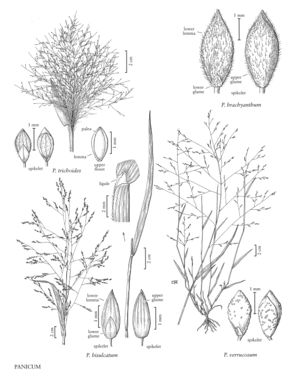Difference between revisions of "Panicum verrucosum"
imported>Volume Importer |
imported>Volume Importer |
||
| Line 47: | Line 47: | ||
|publication year= | |publication year= | ||
|special status=Endemic | |special status=Endemic | ||
| − | |source xml=https://bitbucket.org/aafc-mbb/fna-data-curation/src/ | + | |source xml=https://bitbucket.org/aafc-mbb/fna-data-curation/src/200273ad09963decb8fc72550212de541d86569d/coarse_grained_fna_xml/V25/V25_1302.xml |
|subfamily=Poaceae subfam. Panicoideae | |subfamily=Poaceae subfam. Panicoideae | ||
|tribe=Poaceae tribe Paniceae | |tribe=Poaceae tribe Paniceae | ||
Latest revision as of 18:56, 11 May 2021
Plants annual; weak, ascending or sprawling. Culms 10-150 cm, slender, wiry, erect at first, ultimately decumbent, sprawling, glabrous, often with purple dots and streaks, branching extensively at the base, rooting at the lower nodes. Sheaths often shorter than the internodes, loose, glabrous, margins short-ciliate; ligules 0.2-0.5 mm, membranous, erose, ciliate; blades 5-20 cm long, 3-10 mm wide, thin, flat, glabrous on both surfaces, margins scabridulous, apices long-acuminate. Panicles 5-30 cm, nearly as wide as long; branches few, capillary, with a few spikelets distally; pedicels 0.5-10 mm. Spikelets 1.7-2.2 mm long, about 1 mm wide, ellipsoid or obovoid, glabrous, faintly veined, subacute or obtuse at the apices. Lower glumes 0.3-0.8 mm, reduced, acute; upper glumes and lower lemmas subequal or the glumes shorter, distinctly verrucose, with hemispheric warts; upper florets 1.6-2 mm long, about 1 mm wide, grayish-brown, dull, minutely papillose, acute. 2n = 36.
Distribution
Del., D.C., W.Va., Fla., N.J., Conn., Mass., N.Y., R.I., Tex., La., Tenn., N.C., S.C., Pa., Va., Md., Ala., Ark., Ill., Ga., Ind., Ohio, Mo., Mich., Okla., Miss., Ky.
Discussion
Panicum verrucosum grows primarily in open, moist or wet sandy areas bordering swamps, marshes, or lakes or on roadside ditches; it also grows occasionally in open, drier woodlands. It is restricted to the eastern United States and is mostly, but not exclusively, coastal.
Selected References
None.
